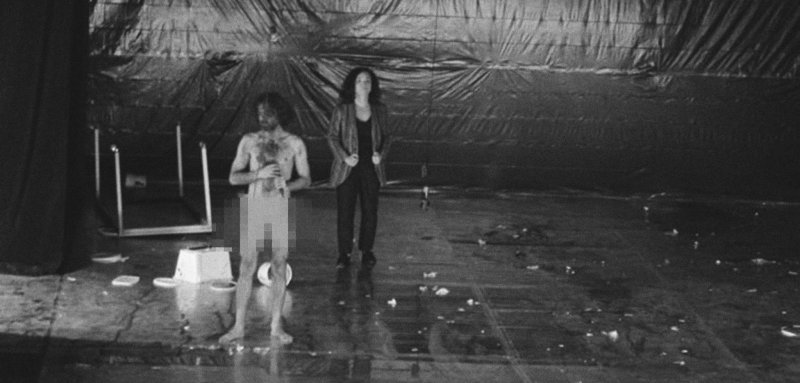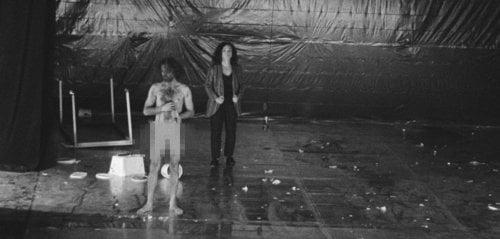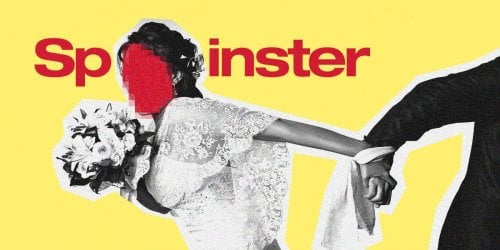During the biennial Carthage Theatre Festival in December 2018, the audience of a theatrical performance was surprised to see one of the performers strip naked on stage, continuing to play his part for a few minutes completely in the nude, prompting a host of angry reactions and disarray amongst the circles of Arab critics. Others treated the incident as an insignificant stunt with the purpose of attracting attention, adding that the performance was poor artistically, aesthetically and rhetorically - with the ‘rhetorical’ evaluation being particularly important for this particular piece, as it addressed a contemporary event: namely the Syrian revolution and war, with its episodes being played out in a psychological theatre piece centred on personalities, plots and twists, struggle and conflict and ultimately culminating with tragedy at the end of the performance. That is, the performance took the form of the prevailing theatrical style employed both in the Arab world and indeed, most of the world’s theatres - with the characters of this performance being devised in a framework whereby each character represents either a collective orientation or party to the Syrian conflict, but without vulgar (cliché) symbolism; that is, with every character being a character with a history and motives which one can observe in society.
Can nudity be justified in the name of drama, and is nudity sometimes a theatrical necessity?
Of course, you won’t arrive at a definitive answer to the above questions, especially in Arab theatrical circles or Arab society more generally, perhaps because of the double standards of Arab society that was put to the test more than once, especially after the outbreak of the Arab Spring, with its multiple stages and twists and turns - as if this stage, with all of its consecutive daily events and incidents, transverse through us not only politically, but socially and cognitively as well. The first port of call through which this journey transits is the body and its questions: is your body holy or profane, your own or your government’s? Is it the receptacle of your ideas only - be they noble or evil - or that of the whole collective?
The problem of the body, nudity and being forced to strip naked was present from the earliest moments of the collective consciousness of the Arab Spring (in all its forms) - for if you undertake a simple online search, you will come to recognise the centrality of the holy and profane Arab body, and the extent of its presence and participation in all of the events that took place since 2011, the year of the Arab eruption.
Accordingly, you will find the picture of the naked Egyptian activist on a blogging site, and the reactions and controversy that arose amongst revolutionary activists at the time surrounding her right to do so: denying her ‘revolutionariness’ or by contrast presenting her as an embodiment of the Egyptian revolution. Later, this particular activist in question would join the worldwide feminist ‘Femen’ movement, taking her nudity to the streets of Europe, with her body that was once essential for its naked presence in Egypt becoming somewhat marginal because the theatre stage had changed - that which once comprised the Egyptian public space, the streets of the “internet.”
Can nudity be justified in the name of drama, and is nudity sometimes a theatrical necessity? The problem of the body, nudity and being forced to strip naked was present from the earliest moments of the collective consciousness of the Arab Spring.
Are the arts subject to particular societal norms? Arab spectators seem to accept nudity on stage such as in rape scenes but still shun voluntary nudity in romantic scenes.
Nudity and violation of the body
The stage nudity of actor Ali Khashaba is inextricably tied to the nakedness of “us Syrians” as a whole, declared Syrian director Ra’afat al-Zaqut in statements after the crisis to the Geiroon media network.
“Tying the body to morals in art does not hold up, and is a terrifying thing that destroys art” al-Zagut said. “You do not have to be tamed and compliant with the popular taste, because the body has its own entity and is a fundamental component of artistic work. For the body in general is a thing tied to the person and personal freedom, while the body also has its artistic character that is tied to the freedom of art. Art must strip down [expose] everything that has to be bare, so that it reveals to us the human cesspit that closes around darkness [obscurantism] and [self-]suppression.”
Indeed, this play also theatrically exhibited another important issue relating to the body: namely, the rape by the main male character of his female counterpart - his sister. This theatrical action represented a symbolic reference to the contemporary violent reality of Syria, which brings us to the Arab body - between the duality of sanctification and desecration, with this duality apparent in the theatrical play “Rape” for the Syrian writer Sa’ad Allah Wanus, a play written in 1989 which continues to be considered a classic - perhaps as a reaction to the events of the first Palestinian intifada (uprising) of 1987.
In the play, Wanus decides to write about the crime of the rape of a Palestinian woman in front of her husband while being interrogated by internal Israeli security forces. Of course, Wanus writes about the incident without theatrical references that allow the embodiment of the raped body on stage, because the writing style is a realistic one that cannot bear imaginings or replacing realistic scenes with symbolic ones, dances and loud and meaningful soundtracks. Furthermore, the likely impossibility of the actor or actors (playing the role of the raped) stripping naked to depict and simulate the rape scene (which generally bears some form of nudity) perhaps opened another door for Wanus to innovate an ingenious script filled with characters and dramatic struggles, to recount the incident and intertwine it with the contrast between the lives of the soldiers - the Israeli torturer on the one hand - and the lives of the Palestinian civilians - the oppressed on the other.
For instance, in this following scene Isaac - an Israeli soldier - narrates to his therapist his actions during the rape/interrogation, which we later find out inflicted him with sexual impotence for psychological reasons.
“Isaac: Suddenly my chest started to tighten, and then the tightening transformed into blind rage, so I took a razor blade and approached her. You know that Arab women shave their pubic hair? Her privates were smooth and covered in the fluids of others. I felt feverish. I bent over her and began to cut some small gouges into her flesh, I cut her on her privates and breasts and then Meir stopped me. Sweat was dripping from me and both of them had lost consciousness.”
When the play “Rape” is performed on Arab stages, generally the rape scene is depicted through silent acting, dances and loud and noisy music - musical symphonies for example. “Rape” revolves around Israeli violations, as well as the fading of the resistance in the face of stability, profit and work under the Occupation state. Israel transforms Palestinians so that they become resentful of the resistance and intifada (uprising), because their daily living is tied to working in Israel.
“Rape” is inspired by another play: namely the double life of Dr. Balmy. Here, we find the actual rape scene along with nudity present in both plays. Indeed, in all of its performances across the different theatres of the Arab world, Wanus’s play is unique in exhibiting a written nude scene on stage; in other words, there is a clear norm and untouchable taboo when it comes to nudity and sexual violence in Arab theatre.
Theatre is an age-old medium returning to the times of all the known ancient civilisations. When studying the old history of theatre students come to examine the era of Roman theatre, which is described in most books as a clear period of degradation of the art, by virtue of the fact that performances in Roman theatre - unlike its Greek counterpart - were filled with violence, murder scenes, and sexual scenes and references.
Thus, the undertaking by the team of the theatrical play “Ya Kabir” (“O Chief”) represents a precedent in breaking theatrical taboos. Of course, much criticism was directed at the team for the nudity of the actor during the play, especially that it was not dramatically important - that is to say, removing it would not have disrupted the dramatic make-up of the play and would not affect the evolution of events in it.
What we mean by this is that it was not a dramatic act tied to the rape scene of a certain person, or forcible nudity under torture, but rather an act undertaken in parallel to the stage monologue of another actress, Amal Omran, who proceeded to recount - in prose - the story of when she discovered that her father was a Syrian intelligence officer and a murderer.
Theatre is usually filled with cliché and events that are recycled; what is important is the framework and context in which the theatrical acts and events take place. Thus we do not embark on a technical evaluation comparing these two templates - “Rape” and “O Chief” - but rather attempt to analyse the action of nudity on stage and how it is linked to what we are going through politically and socially - namely, tests of the body. This has been filmed and circulated, and there is another old incident in which a Christian woman was forced to strip naked. This came from Egypt, taking place in our lives and circulated in video clips. Yet Egypt has no war; rather, this is derived from the distortion in the use of religious and social authority. In the contemporary Syrian context, there are dozens of such stories, perhaps most prominently the story of the Kurdish fighter “Barin Kobani”, whose mutilated body - specifically her breasts - was circulated in video clips after her death - bringing to memory the aforementioned rape scene of the Palestinian woman in the theatre play “Rape.”
When considering the aesthetics and art of performance, theatre and the positioning of the body within them, I find that nudity on stage is not simply a meaningless abstract act; it is an act that shocks the recipient and forces them immediately to think of their safe bodies, and what surrounds it from holy halos on one hand and stigmas of the profane on the other - with reactions differing according to the values, beliefs, and contexts of time and place. For the act of nudity on European stages has become a sort of cliché, even if it is a dramatic necessity - perhaps because of the belief of the cultured European spectator that this act is a fundamental part of the profession and craft of the actor, who has become accustomed to undertaking this act on stage or even doing so voluntarily; meanwhile, the Arab spectator is not as afflicted or shocked by forced nudity, as much as he/she is by voluntary nudity.
Raseef22 is a not for profit entity. Our focus is on quality journalism. Every contribution to the NasRaseef membership goes directly towards journalism production. We stand independent, not accepting corporate sponsorships, sponsored content or political funding.
Support our mission to keep Raseef22 available to all readers by clicking here!
Interested in writing with us? Check our pitch process here!









